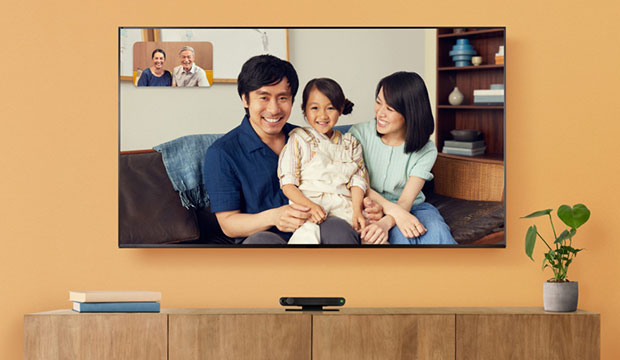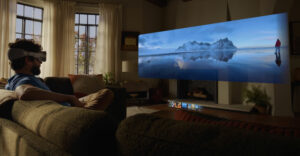Facebook on Wednesday announced three additions to the Portal family: a new Portal, Portal Mini and Portal TV.
The devices let users make calls using Facebook Messenger and WhatsApp.
The Portal has a new design that resembles a picture frame. The Portal Mini is similar but smaller. The Portal TV looks like a set-top box and comes with its own controller.

The Portal TV blends the functionality of a set-top box with social media and video conferencing, observed Rob Enderle, principal analyst at the Enderle Group.
“It’s light on the set-top box part, lacking Netflix, but the other two features are unique,” he told TechNewsWorld.
The Portal has a 10-inch HD display and the Portal Mini has an 8-inch HD display. Both have the following capabilities and features:
- Video calling, photo display, and video watching in either portrait or landscape orientations;
- Adaptive display that adjusts brightness and color to the surroundings for video calls, photos and videos; and
- Built-in speaker.
The Portal TV allows smart video calling from users’ TV sets and has an artificial intelligence-powered smart camera that intelligently pans and zooms to stay with users while they move around when talking.
AI-powered smart sound enhances the voice of the speaker while minimizing unwanted background noise.
The Portal TV sits on top of or below a TV set.
Story Time on Portal adds animation, music and AR effects to stories.
Portal TV also lets users view Facebook Watch content.
The Amazon Prime video app on Portal lets users stream shows and movies, including Amazon Originals.
Users also can download Showtime, CBS All Access, Starz and Red Bull TV. More apps are expected.
The Portal family currently is available in the United States and Canada, as well as the UK, France, Italy, Spain, Australia and New Zealand.
The Portal is priced at US$179; the Portal Mini at $129; and Portal TV at $149. Customers who purchase a bundle of any two Portal devices get $50 off.
The Portal and Portal Mini begin shipping Oct. 15; the Portal TV will ship Nov. 5.
Users can preorder the Portal devices from Facebook and select retailers.
Voice Commands
Users can issue voice commands to Portal by saying “Hey Portal.” This command is available in U.S. and Canadian English, and soon will be available in other languages.
All Portal devices have Alexa built in and offer access to Alexa skills.
Portal users can make voice calls either through Facebook Messenger or WhatsApp.
All WhatsApp calls are encrypted end to end.
Audio recordings and transcripts of voice interactions made using the “Hey Portal” command are sent to Facebook, which may review samples to improve its voice services, the company said.
“I think the ‘improve its services’ bit is a canard — a ruse to access client information,” said Mike Jude, research manager at Frost & Sullivan.
“Improving voice recognition is one thing, but presumably this could be obtained in other ways — third-party voice analytics firms, for example,” he told TechNewsWorld. “The services thing is kind of open ended and could imply a lot of different uses.”
Facebook previously used outside contractors to review audio clips of conversations conducted via Facebook Messenger. It discontinued the practice last month, after media disclosures made it public.
Portal Device Cameras
The Portal camera automatically pans and zooms in on the person talking, but it can be configured to track a specific individual.
The camera relies on AI maps of people based on their shirts, rather than their faces, when tracking individuals to pan the camera, Portal Product Manager Elliott Poppell reportedly said. The camera can follow individuals around even when they have their back turned toward the lens.
The AI technology for smart camera and smart sound runs locally on Portal and not on Facebook servers.
Users can disable the camera and microphone with a single tap or with a sliding switch. An indicator light shows the on/off status. The camera has an integrated lens cover.
Users can view, hear and delete any of their voice interactions in their Facebook Activity Log. They can turn off voice storage in settings any time to prevent storage and review.
“I wouldn’t trust Facebook with a camera and microphone in my home,” Enderle remarked. “They’ve had too many privacy issues.”
Facebook will track which videos Portal users view, to help it better target ads. It also will collect data on video calls made with Facebook Messenger, such as the length and frequency of calls.
Amazon and third-party developers can collect the same data from signed-in consumers on Portal that they can from any other device.
“User data has great value, and Facebook has been pretty mercenary about how it collects and uses such data,” Jude said. “Placing one of these portals in your home is like having a camel’s nose in your tent. Once in place, there is virtually no way to guarantee privacy and safety.”
A set-top box combined with video-conferencing capabilities “is an interesting idea,” Enderle said. “The downside is Facebook — and for a company that has a horrid reputation with regard to privacy, this is way too much access to your private information.”
Getting a Portal TV would be “like giving a criminal access to your bank account,” he quipped. “If they stole from you everyone would think you were an idiot.”























































